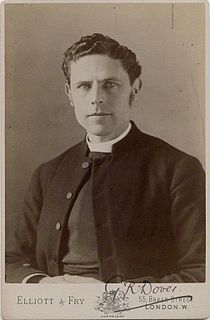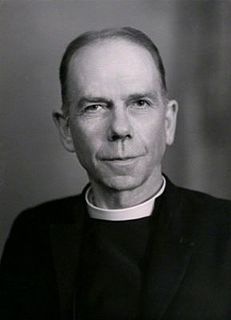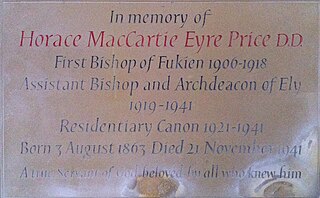
Robert Hamilton Moberly was the 7th Anglican Bishop of Stepney from 1936 until 1952 when he was appointed Dean of Salisbury.
Carey Frederick Knyvett (1885–1967) was the 2nd Bishop of Selby.

George Rodney Eden was an Anglican bishop, Bishop of Dover and then Bishop of Wakefield.

Frank Russell Barry was an Anglican Bishop and author who served as Bishop of Southwell for over 20 years in the middle of the 20th century.
Frederick Ochterloney Taylor Hawkes was the fourth Bishop of Kingston.
William Marshall Selwyn was an Anglican suffragan bishop in the 20th century.
The Right Reverend Ian Harland was a Church of England cleric, serving as Anglican Bishop of Lancaster then Bishop of Carlisle.
Leslie Hamilton Lang 27 May 1889 – 12 March 1974) was the fourth Bishop of Woolwich.
Clifford Leofric Purdy "Jim" Bishop was the Suffragan Bishop of Malmesbury from 1962 until 1973 in the Church of England.
Albert Edward Hughes was Bishop of Kilmore, Elphin and Ardagh from 1939 to 1950.
Francis Featherstonhaugh Johnston was the third Bishop of Egypt from 1952 until 1958. Johnston served continuously in the Middle East from 1916 to 1957.
Henry Charles Robins was the Dean of Salisbury in the Church of England from 1943 until his retirement in 1953.
Born in Beccles on 2 February 1882 and educated at Winchester and New College, Oxford, he was ordained into the priesthood in 1908. His first post was as a Curate at St John’s, Gosport after which he was an Assistant Chaplain in Khartoum then Vicar of Fleet. In July 1918, he joined the Army Chaplain's Department. At 6 feet 2 inches, he was an impressive figure, and served at Catterick Garrison and then in France until he was demobilised in 1920. He was described as 'able... lacks in tact and patience in dealing with men' From 1922 to 1943 he held incumbencies at Chafford, Barking and Portsmouth before his elevation to the Deanery. An Honorary Chaplain to the King, he died on 31 July 1960; and his wife Dorothy 9 years later.
Noel Charles Christopherson, MC was the Dean of Peterborough in the Church of England from 1943 until 1965.
Peter Knight Walker was an Anglican bishop.
David Goodwin Loveday was an Anglican bishop during the second half of the 20th century.
Henry McGowan was an Anglican bishop in the first half of the 20th century.
The Rt Rev William Wilson Cash DSO OBE DD was an Anglican Bishop in the middle part of the 20th century. Cash was unusual for a bishop of a diocese in England at that time in that he was not public school nor Oxbridge educated.

Horace MacCartie Eyre Price was a missionary of the Anglican Church.

John Orfeur Aglionby was Bishop of Accra during the second quarter of the 20th century.
John Norman Bateman-Champain was a first-class English cricketer, making five appearances for Gloucestershire, who later in life became the third Anglican Bishop suffragan of Knaresborough. Bateman-Champain was a right-handed batsman.




